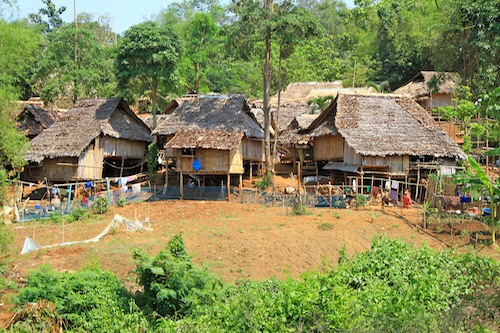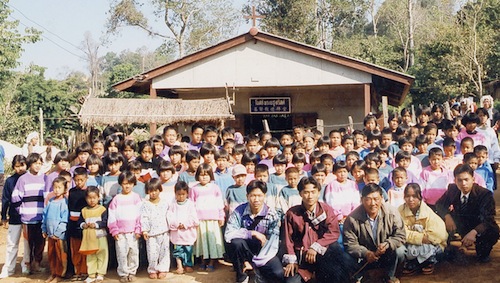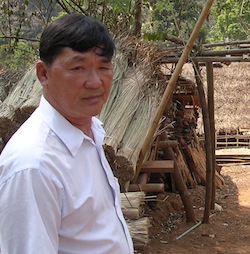02 Aug An Overview of Our Work in Thailand

A village in northern Thailand.

One of our congregations in Thailand.
Here is some updated information that Mark Choi, the Hong Kong Mission Director, sent regarding Thailand. Hong Kong provides primary oversight of United Brethren ministries in Thailand.
Background and Current Status of the North Thailand Ministry
The United Brethren churches of Hong Kong (HK CUBC) have developed our ministry in the Northern Thailand mountain areas, close to the border of Myanmar (Burma). Concentrating in the region called “Piao Pai,” there are 3 villages, namely Laozuo, Litao, and Roman (or Loh Mah) villages. Inhabitants of Litao and Roman villages are primarily ethnic minority Ahka who speak the Ahka language. In Laozuo, the inhabitants consists of Chinese (Mandarin speaking), Lahu (Lahu speaking), and Ahka. Many of them cannot speak Thai.
The area is very mountainous with little flat land, and is very remote to other parts of Thailand. The nearest major city is Chiang Rai, which is a two-hour drive through mountainous roads. The mountain people are poor and many do not have a proper national identity card in Thailand. Among the three towns, Laozuo village is more developed and has a government public school, a clinic, and a private Chinese school, Zhongxing Middle School, which provides Chinese education to the local students.
The Piao Pai and neighboring areas along the border with Myanmar and Laos have been under the influence of drug dealers in the past. Known as the “Golden Triangle,” the area’s drug dealers once had their own guerrilla army that controlled the region. The villagers earned a living by growing opium. It was only in the last 10–20 years that the Thai government gradually regained control of the area, but guerrilla drug dealers still operate on the Myanmar side of the border. They cross into Thailand from time to time, and villagers remain under constant threat.
Today villagers have replaced opium with tea, and the economy of the Piao Pai region relies heavily on large plantations. As the area is mountainous with lots of slopes, and the climate is relatively cool compared to most parts of Thailand, it is quite suitable to grow tea. The villagers pick the tea leaves by hand and deliver their crops to collector factories run by Taiwanese. Work is heavy and the income is low.

Rev. Lee is the founder and leader of our ministries in northern Thailand.
At present, the HKCUBC Northern Thailand ministry has two churches and one student center in Piao Pai. The two churches are located in Litao and Roman, and they have approximately 300 members. The student center is located in Laozuo village, next to the home of Rev Li. The student center provides accommodation and care to orphans and children who cannot receive proper parental care. In some cases the parents are migrant workers who travel to neighboring plantations to harvest tea. Most are of the Ahka tribe. They can stay in the student center up to the age of 16-18. Currently, there are around 25 students.
There are three workers in the Northern Thailand ministry:
- Rev. Li Xuewen (Li Hok Man – Cantonese, or Rev. Lee – English) who is of Chinese ethnicity and is now 61 years old. He started the mission work, and is the minister in-charge. He speaks Mandarin, some Thai, and Ahka.
- Mr. Ah Tu is a young minister in his thirties and pastors the Roman church. He is from Myanmar and speaks Ahka.
- Miss Ah Duer, a young woman from the villages, oversees the Student Center, caring for the physical and spiritual needs of the students.
Some three years ago, connections were established with the Chinese school in Laozuo village. Short-term teams from Hong Kong have been invited in the past to offer English, health, and recreational group activities. This year, the Hong Kong United Brethren will offer several scholarship awards to the school as well.
The Zhongxing Chinese School is located on a hilltop a short walk from the Student Center, and consists of several one-story classroom buildings that are quite old and out-dated. There are around 350 students in the school, ranging from kindergarten to grade nine. Some of the teachers are immigrants/refugees from the People’s Republic of China. They have found safe haven in the area but are often undocumented.
The school plans to re-develop and update the classrooms, but capital is needed. While it still has no proper accreditation or religious orientation, it has received donations in the past from Caritas (an international charity) and from some Chinese Buddhist temples. A short time ago, the school even approached our mission to see if the United Brethren would be interested in taking over the school and developing it further. However, we recently heard that the school accepted a sum of money from a Chinese temple, though not adequate for the re-development project.
Long-term Goals of the CUBC Northern Thailand Mission
- Continuous work to help the Ahka churches grow in both size and spiritual maturity.
- Strengthen the spiritual care to the students in the Student Center, to prepare them spiritually and academically after they leave the center and the mountain villages to seek employment or further education.
- Seek opportunity to start ministry in the Laozuo village, possibly through some form of cooperation with the Chinese school. If the mission can take over the Chinese school, it will become a good site for evangelical work to students and their family. A church can be built inside the school.
- Help develop the economic strength of the villagers and congregations, such that the Ahka churches may become financially independent and living standards of the villagers may improve.

No Comments